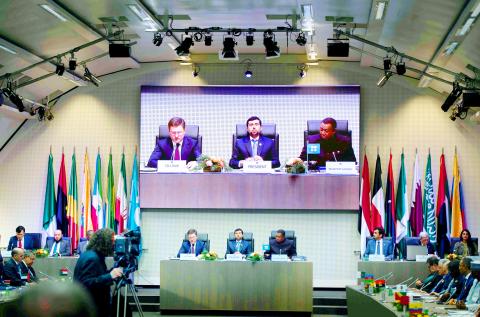The COVID-19 coronavirus outbreak in China and its rapid spread has taken its toll on the global economy, driving down demand for oil in the first weeks of 2020.
In response, in the scheduled meeting on March 5-6 in Vienna, Saudi Arabia and other OPEC (Organization of the Petroleum Exporting Countries) states called for OPEC+ to a make drastic cut of 1.5 million barrels per day to reduce supply by a total of 3.6 million barells per day — insisting on a non-OPEC agreement. However, Russia rejected the plan. When the OPEC+ talks collapsed, the OPEC oil cartel scrapped all output limits. A dispute then broke out.
Russian oil companies had opposed such cuts, fearing loss of market share and of competitiveness against US shale production. They had previously in December agreed on a milder production cut of 500,000 barrels in 2020, and Russia wanted this to continue.

Photo: AP
照片:美聯社
Saudi Arabia, the world’s biggest crude exporter, responded on March 8 by announcing unilateral price cuts with its biggest price cut in 20 years in a bid to win market share. This prompted the oil price to plummet and fuelled huge drops on stock markets the following day.
By March 9, oil had fallen to as low as US$31 from about US$66 at the end of 2019 as Riyadh said it would lift production to record highs, their biggest one-day move since the 1991 Gulf War.
On March 10, Saudi oil giant Aramco announced a plan to massively increase oil output despite falling demand during the COVID-19 coronavirus outbreak.

Photo: AFP
照片:法新社
“At first glance, this looks like a battle between Russia and Saudi Arabia over oil policy,” said Chris Weafer of Macro Advisory consultancy. “But the context of the relentless rise in US oil production over the past 10 years is also an important factor.”
Both Russia and major OPEC producers have been “openly annoyed” with US producers’ refusal to participate in past production cuts, he added.
On Monday and Thursday last week, the crash in oil prices and fears over the global economic impact of the virus outbreak prompted a meltdown on stock markets.
(AFP and Reuters)
在中國爆發的武漢肺炎冠狀病毒迅速蔓延,讓全球經濟遭受巨大損失,對石油的需求在二〇二〇年開年數週便降低了。
因應此情況,沙烏地阿拉伯與其他石油輸出國組織(OPEC)國家三月五日至六日在維也納所舉行的例行會議中,便要求OPEC+國家每日大幅減產一百五十萬桶,讓石油每日供應總量減少三百六十萬桶,並堅持非屬OPEC之產油國也須共同遵守此協議。但俄羅斯拒絕了此計畫,談判破裂,OPEC這石油壟斷利益集團便取消了所有產量限制,爭端於焉爆發。
俄羅斯的石油公司曾對這種減產措施加以反對,擔心會失去市佔率,也會失去對美國頁岩油的競爭力。他們去年十二月曾同意一項較溫和的減產計畫,將在二〇二〇年減產五十萬桶,俄羅斯希望維持此計畫。
三月八日星期日,世界最大的原油出口國沙烏地阿拉伯對此做出回應,單方面宣佈降低油品價格,以贏得市佔率,此為二十年來最大降幅。這使得油價暴跌,並引發了三月九日星期一的股市大跌。
利雅德表示將把產量提升至歷史新高,到了三月九日,油價便從二〇一九年底的六十六美元左右,應聲跌至三十一美元,這是自一九九一年波斯灣戰爭以來的最大單日跌幅。
儘管武漢肺炎冠狀病毒爆發造成石油需求下降,沙烏地石油巨頭阿美公司仍在三月十日宣布,要大幅提高石油產量。
「乍看之下,這像是俄羅斯與沙烏地阿拉伯在石油政策上的鬥爭」,宏觀諮詢公司的克里斯‧威佛表示。「但是,過去十年來美國石油產量的持續增加,也是重要的背景因素」。
他補充說,美國生產商始終拒絕參與減產,俄羅斯和OPEC主要產油國都對此感到「公開地惱火」。
油價暴跌,以及擔憂疫情對全球經濟造成影響,導致上週一及週四的股市崩盤,觸動了熔斷機制。
(台北時報林俐凱編譯)
FOLLOW UP 讀後練習
Did you know?
The Organization of the Petroleum Exporting Countries (OPEC) was set up in 1960 to coordinate oil production policy among its members. In recent decades, however, it has increasingly cooperated with producers outside the group to manage the market.
As of January 2020, OPEC has 13 member countries: five in the Middle East, seven in Africa and one in South America.
OPEC+ includes 10 other non-OPEC members, including Russia.
(Lin Lee-kai, Taipei Times)

The strongest earthquake to hit Taiwan in 25 years killed at least 16 people and damaged dozens of buildings, but the destruction was largely contained thanks to decades of preparedness work. Taiwan sits on the “Ring of Fire,” an arc of intense seismic activity along the Pacific Rim, and — much like neighboring Japan — has a long history of catastrophic quakes. How does April 3 compare with other recent quakes? The April 3 earthquake, which measured 7.4 on the moment magnitude scale, was felt across Taiwan. It was the most severe since a 7.6 magnitude quake in 1999 killed

A: Artificial intelligence technology has been causing controversy lately: a student was caught cheating with AI to win the grand prize in an art contest. B: That’s so absurd. Does this mean that AI paints better than humans? A: Maybe. Luckily, the student was later disqualified. B: And more absurdly, it’s becoming more and more popular to use AI technology to “resurrect” people. A: Yeah, some netizens even posted videos featuring the late singer CoCo Lee, who was “resurrected” by them with AI software. A: 人工智慧的爭議不斷,有學生違規使用AI參加美術展,甚至贏得首獎。 B: 真誇張,這是不是代表AI比人類還強大? A: 或許吧,幸好得獎資格被取消。 B: 還有更誇張的︰讓死者重現的「AI復活」技術越來越熱門。 A: 對啊,還有網友製作已故歌后李玟「復活」的影片呢! (By Eddy Chang, Taipei Times/台北時報張聖恩)

Around the time of the Dragon Boat Festival in June, the streets of Taiwan are filled with the delightful aroma of zongzi, a traditional snack made of sticky rice wrapped in leaves. The leaves are folded into a cone and then filled with sticky rice and other ingredients such as braised pork belly, peanuts and salted duck egg yolks. The filled leaves are then tightly tied with kitchen twine and ready for cooking. 每到六月端午時節,街頭巷尾就會飄出粽子的香氣。粽子是將糯米包進粽葉的傳統美食,先將粽葉折成圓錐狀塞入糯米,以及紅燒肉、花生、鹹鴨蛋黃等配料,用棉線綁緊後即可烹煮。 Dragon Boat Festival (n. phr.) 端午節 aroma

It’s another school day with the same ritual. You wake up to your smartphone’s alarm, scroll through messages during your commute, and listen to your favorite playlist with your wireless earbuds between classes. These devices, integrated smoothly into your daily routine, certainly make life more convenient. However, where do these devices end up after you replace them? In fact, the issue of electronic waste is a growing global concern. According to the United Nations, in 2019 alone, we generated an astonishing 53.6 million tons of e-waste—an average of 7.3kg per person. Projections hint at the figure soaring to 110